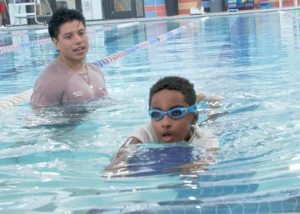A Look into the Relationship Between Swimming and Mental Health
Mental health disorders like anxiety, depression, and chronic stress debilitate well-being and diminish the quality of life and happiness for a staggering number of Americans.
Over 40 million adults in the US suffer from clinically diagnosed anxiety, while 7% of youth face this issue.
This widespread mental health strain demands affordable and accessible interventions. However, many barriers prevent people from receiving the help they need.
But what if there was a cost-effective, accessible remedy that reduces cortisol, inflammation, and relieves stress and anxiety?
The Link Between Mental Health and Swimming
Our bodies comprise 75% water, so it makes sense that water immersion triggers various neurological responses, promoting inner tranquility.
Blue spaces like the sky, ocean, lake, or pool improve mental and physical health.
Exposure to water helps us refocus our awareness from worries to coordinating balance and breath. While immersed in water, the weightlessness sensation promotes the antidote to ‘fight or flight,’ called ‘rest and digest,’ a positive parasympathetic nervous system response to help slow your heart rate and metabolism and evoke deep relaxation.
Natural ‘mood-boosting’ receptors become activated:
- Endorphins – alleviate pain and induce euphoria
- Dopamine – controls reward and pleasure centers
- Serotonin – stabilizes mood and regulates happiness
Even brief water immersion offers significant benefits to help calm the body and mind.
Swimming Relieves Anxiety, Trauma, and Stress
While expensive floatation pod therapy effectively reduces symptoms of stress and trauma, simple aquatic exercise allows similar mental payoffs with only basic swim skills.
Advantages of swimming for mental health include:
Stress Relief: Mental tension dissolves with each coordinated breath, kick, and arm stroke. This built-in mindfulness transports swimmers from worrying toward pleasure derived ‘in the moment.’
Elevated Mood: Increased neurotransmitter activity elicits positive emotions while lowering cortisol levels.
Confidence Boost: Mastering physical challenges builds self-assurance. Feelings of accomplishment activate the reward center of our brains, improving self-esteem and increasing our resilience to daily obstacles.
Social Connectivity: Swimming with another person or within a group setting nurtures bonding and accountability, alleviating isolation that can contribute to depression.
Improved Sleep: Swimming in cool water triggers thermogenesis followed by a drop in core temperature post-swim that cues drowsiness. The self-soothing nature of being immersed in water amplified melatonin production.
Swimming builds resilience by connecting physical activity to mental peace.
Mental Health and Swimming for Every Age and Ability
Swimming has mental health benefits for people of all ages and all fitness levels!
For older adults who may feel lonely or have mobility issues, water exercise provides a gentle activity that goes easy on the joints while relieving depression through social connections. Motion keeps aging adults’ minds sharp and engaged.
Adults experiencing fatigue, stress, or burnout can find peace in the pool. Meeting swim goals can help you feel productive again, even when work feels overwhelming.
Swimming helps boost blood flow to the brain, resulting in:
- Increased patience
- Relaxation
- More creativity
- Feeling re-energized
Anxious and overwhelmed teens can relax and play with friends in the pool. Focused breathing and swim lessons also help to alleviate stress.
Experience a Range of Water Activities for Mental Health
The benefits of swimming and mental health go beyond pool laps.
Discover more ways to reap the benefits of water immersion:
Breathwork: Practicing deep belly breaths while immersed in water boosts parasympathetic relaxation.
Back Floating: Passively drifting cultivates surrender to support.
Pool Yoga: Gentle stretching and flowing movements increase mindfulness.
Water Walking: Low-impact cardio nurtures clarity of mind.
Social Games: From Marco Polo to Water Volleyball, playfulness promotes laughter and bonding.
Aquatic Immersion in Nature: Lakes, rivers, and oceans inspire and relieve tension, anger, anxiety, and depression.
Leverage water’s many benefits by exploring different ways to navigate its natural properties to experience various sensorial perks.
Find Inner Tranquility in the Water
At WeAquatics, we know swimming provides whole-health benefits, not just physical fitness and building skill sets.
By learning essential swim skills in our one-on-one Learn-to-Swim classes, people of all ages and abilities gain the skills to handle life’s ups and downs.
Contact WeAquatics to discover a class that will support you in your whole-body swim goals and elevate your quality of life.





